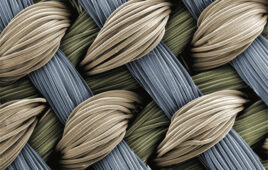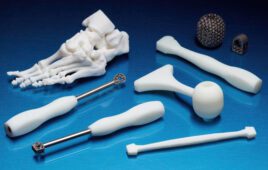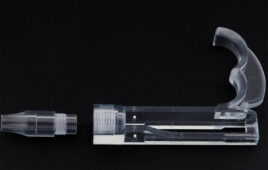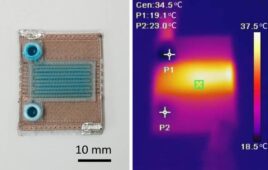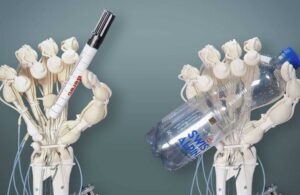
3D printed in one go: A robotic hand made of varyingly rigid and elastic polymers[Image courtesy of Thomas Buchner/ETH Zurich]
The team can now print these complex robots in one go and combine soft, elastic and rigid materials. This enables the creation of delicate structures and parts and parts with cavities as desired.
Massachusetts Institute of Technology (MIT) spinoff Inkbit developed the new printing technology. ETH Zurich researchers developed several robotic applications and helped optimize the technology for use with slow-curing polymers. The researchers jointly published their work in the journal Nature.
Using this new technology, the researchers succeeded for the first time in printing a robotic hand with bones, ligaments and tendons made of different polymers in one go.
“We wouldn’t have been able to make this hand with the fast-curing polyacrylates we’ve been using in 3D printing so far,” said Thomas Buchner, an ETH Zurich doctoral student and first author of the study. “We’re now using slow-curing thiolene polymers. These have very good elastic properties and return to their original state much faster after bending than polyacrylates.”
The researchers — including ETH Zurich robotics professor Robert Katzschmann — say their methods make thiolene polymers ideal for producing the elastic ligaments of the robotic hand. They can also fine-tune the thiolenes’ stiffness to meet the requirements of soft robots.
“Robots made of soft materials, such as the hand we developed, have advantages over conventional robots made of metal. Because they’re soft, there is less risk of injury when they work with humans, and they are better suited to handling fragile goods,” Katzschmann said.
To accommodate the slow-curing polymers, researchers developed 3D printing further by adding a 3D laser scanner. The scanner immediately checks each printed layer for any surface irregularities. Instead of smoothing out uneven layers, the technology takes unevenness into account when printing the next layer.
“A feedback mechanism compensates for these irregularities when printing the next layer by calculating any necessary adjustments to the amount of material to be printed in real time and with pinpoint accuracy,” said study co-author and MIT professor Wojciech Matusik.
Matusik is a co-founder at Inkbit, along with CEO Davide Marini and Chief Technology Officer Javier Ramos.

